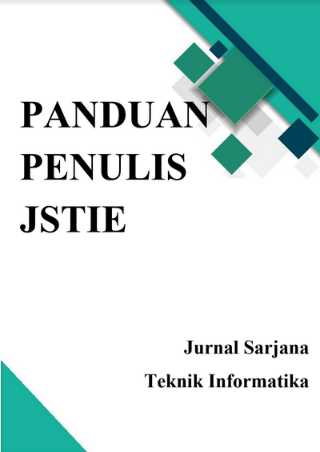Pengembangan Sistem Authoring Tools untuk Publikasi Jurnal Ilmiah Berbasis Web
DOI:
https://doi.org/10.12928/jstie.v7i2.15825Keywords:
authoring tools, jurnal, e-journal, reader, webAbstract
Jurnal ilmiah merupakan salah satu jenis jurnal akademik dimana penulis mempublikasian artikel ilmiah. Untuk memastikan kualitas ilmiah pada artikel yang diterbitkan, suatu artikel bisa diteliti oleh rekan-rekan sejawatnya dan direvisi oleh penulis, hal ini dikenal sebagai peer review (penelaahan sejawat). Selama ini jurnal ilmiah sudah terbuka secara elektronik kemudian dikelola oleh redaksi jurnal. Pengelola jurnal ilmiah di Indonesia saat ini menggunakan Open journal system (OJS) yang dikembangkan oleh Public Knowledge Project. Kendala implementasi OJS, salah satunya adalah manajemen penerbitan secara elektronik yang belum sepenuhnya di laksanakan, baik oleh penulis, penerbit maupun mitra bestari (reviewer). Jadi bisa dikatakan penerbitan jurnal elektronik di Indonesia saat ini membuat versi cetak menjadi on-line dalam bentuk dan format PDF reader. Beberapa kendala tersebut bisa diatasi dengan adanya Aplikasi authoring tools jurnal ilmiah berbasis web. Metodologi yang digunakan dalam penelitian ini yaitu melakukan pengumpulan data menggunakan metode studi pustaka dan wawancara. Kemudian dianalisis untuk menentukan kebutuhan user dan kebutuhan sistem. Implementasi aplikasi memanfaatkan Codeigniter framework dan MySql database untuk penyimpanan data. Hasil dari penelitian ini adalah pengembangan aplikasi authoring tools jurnal ilmiah berbasis web yang digunakan untuk mempermudah penulis buku dalam menulis, mereview dan mengedit konten digital berbasis web melalui peramban. Pengujian sistem dengan metode black box dengan hasil lulus dan telah sesuai dengan kebutuhan pengguna. Selain itu digunakan juga metode post-study untuk mengetahui tingkat usability aplikasi yang dikembangkan ini dengan nilai 89.58 (skala 0..100).References
Gu, X., Wu, B., & Xu, X. (2015). Design, development, and learning in e-Textbooks: what we learned and where we are going. Journal of Computers in Education, 2(1), 25– 41.http://doi.org/10.1007/s40692-014-0023-9Kotler, Philip, 2002, ManajemenPemasaran,Prenhalindo, Jakarta.
Erhan, D. (2014). Effect of hypertextual reading on academic success and comprehension skills. Educational Research and Reviews, 9(14),447–455.http://doi.org/10.5897/ERR2013.1405
Harmin, A. (2016). Authoring Tools Algoritma Dan Pemrograman Sebagai Media Pembelajaran On-Line Pada Stmik Profesional Makassar (Studi Kasus Matakuliah Algoritma Dan Pemrograman), 1–12.
Sinung. (2014). Pengembangan native front- end aplikasi pembaca skripsi di perpustakaan kampus iii uad menggunakan android tablet.
Realitha,Cindy.2012.PengembanganBack-EndSystemPadaAplikasiInteractiveE-bookReader Di Android Menggunakan Framework Phonegap.
Singgih. (2015). Pengembangan user experience (ux) dan user interface (ui) sistem manajemen perpustakaan desa berbasis saas.
Booch, G., Rumbaugh, J. & Jacobson, I., 2005. The unified modeling language user guide Second Edition. , p.496.
Sidiq, M. A. (2012). Content pada pengembangan CMS menggunakan codeigniter. Undergraduate thesis, Universitas Stikubank ( Unisbank ) Semarang.
Sommerville, Ian , 2007, Software Engineering – Eight Edition, Addison Wesley, Massachussets.
Gulzar, N., 20 Lukman, Ekawati Marlina, Ratih Keumalasari, Al Hafidz Akbar Maulana Siagian, S. R. (2012). Perkembangan Open Acces Jurnal Ilmiah Indonesia. Prosiding Konferensi Perpustakaan Digital Indonesia (KPDI) Ke-5, (January 2016), 1–8. https://doi.org/10.13140/2.1.1159.2009.
Downloads
Published
Issue
Section
License
License and Copyright Agreement
In submitting the manuscript to the journal, the authors certify that:
- They are authorized by their co-authors to enter into these arrangements.
- The work described has not been formally published before, except in the form of an abstract or as part of a published lecture, review, thesis, or overlay journal. Please also carefully read Journal Posting Your Article Policy.
- The work is not under consideration for publication elsewhere.
- The work has been approved by all the author(s) and by the responsible authorities – tacitly or explicitly – of the institutes where the work has been carried out.
- They secure the right to reproduce any material that has already been published or copyrighted elsewhere.
- They agree to the following license and copyright agreement.
Copyright
Authors who publish with Jurnal Sarjana Teknik Informatika agree to the following terms:
- Authors retain copyright and grant the journal right of first publication with the work simultaneously licensed under a Creative Commons Attribution License (CC BY-SA 4.0) that allows others to share the work with an acknowledgement of the work's authorship and initial publication in this journal.
- Authors are able to enter into separate, additional contractual arrangements for the non-exclusive distribution of the journal's published version of the work (e.g., post it to an institutional repository or publish it in a book), with an acknowledgement of its initial publication in this journal.
- Authors are permitted and encouraged to post their work online (e.g., in institutional repositories or on their website) prior to and during the submission process, as it can lead to productive exchanges, as well as earlier and greater citation of published work.







